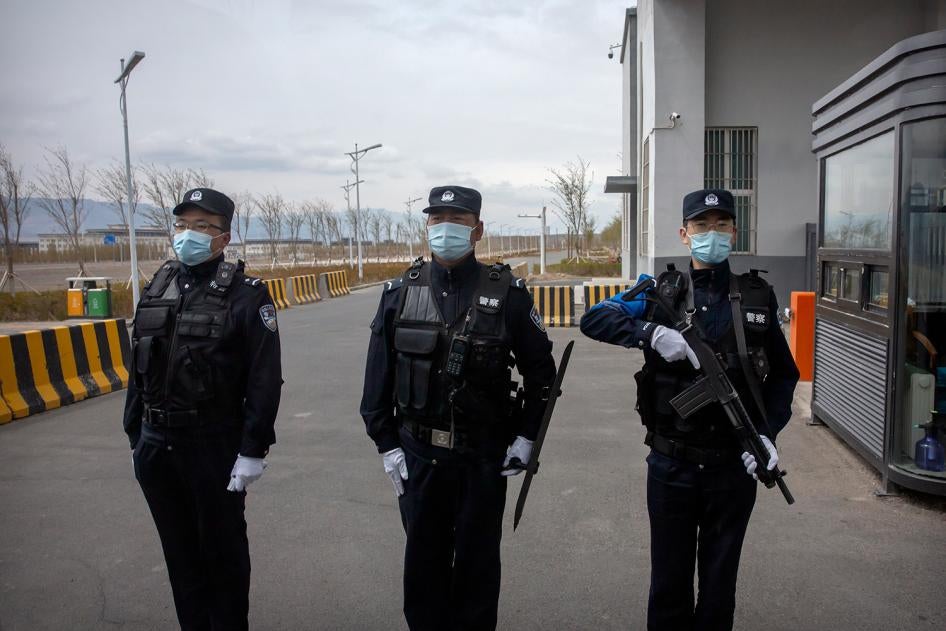Illegal Forced Transfers of Ukrainians to Russia: Daily Brief
- Russia’s “Filtration” and Forced Transfers from Ukraine;
- UN Rights Chief’s Xinjiang Report Finally Released;
- Welcome to the New Daily Brief;
- Take Note: Other Key Stories;
- My Personal Goodbye to Ken Roth;
- Reader Question: Report Embargos;
- Reader Suggestions.
Illegal Forced Transfers of Ukrainians to Russia
Russian and Russian-affiliated militaries have been forcibly transferring Ukrainian civilians, including those fleeing hostilities, to Russia and to Russian-occupied parts of Ukraine, a new Human Rights Watch investigation confirms.
In a much anticipated report released today, HRW describes the forced transfers as a serious violation of the laws of war that constitute war crimes and potential crimes against humanity.
The overall scale of the transfers remains unclear, but it appears massive. In late July, the Russian News Agency (TASS) reported that more than 2.8 million Ukrainians had entered the Russian Federation from Ukraine, although this number has not been independently confirmed, and it’s likely not every transfer would qualify as forced.
Under international law, a forcible transfer is not just the obvious case of being moved at gun point. It also includes a transfer in circumstances in which a person consents to move only because they fear consequences such as violence, duress, or detention if they remain, and the occupying power is taking advantage of a coercive environment to transfer them. Transferring or displacing civilians is not justified or lawful on humanitarian grounds if the humanitarian crisis triggering the displacement is the result of unlawful activity by the occupying power.
The new research also reveals how Russian and Russian-affiliated authorities have subjected thousands of Ukrainian citizens to a form of compulsory and punitive security screening they refer to as “filtration.”
During this process, which thousands of residents from the Mariupol area were forced to undergo while trying to flee, Russian and Russian-affiliated officials in the Russian-occupied region typically collected civilians’ biometric data. This included fingerprints and front and side facial images. They also conducted body searches and searched personal belongings and phones, and questioned people about their political views.
As my colleague, Belkis Wille, senior crisis and conflict researcher and co-author of the report says, “no one should be forced to undergo an abusive screening process to reach safety.”
UN Rights Chief’s Xinjiang Report Finally Released
In her very last moments in office last night, outgoing UN High Commissioner for Human Rights Michelle Bachelet finally published her report on the appalling situation in China’s Xinjiang province.
The report, promised a year ago, may be late, but it is nonetheless groundbreaking. It declares that the Chinese government has committed abuses that may amount to crimes against humanity targeting Uyghurs and other Turkic communities in Xinjiang. The report is a direct challenge to the Chinese government’s blatant disregard for its international human rights obligations.
The high commissioner’s report not only presents victim accounts that further substantiate what previous research has found: mass arbitrary detention, torture, cultural persecution, forced labor, and other serious human rights violations. But perhaps even more importantly it recommends that states, businesses, and the international community take action with a view to ending the abuses, and advancing justice and accountability.
So, what happens next?
The report should be formally presented to the UN Human Rights Council as a matter of priority, so that states can discuss its findings and take the steps needed to implement its recommendations. The follow-up by UN member countries and bodies could take the form of an investigation to interview victims and survivors, identify those responsible, gather evidence, and recommend strategies for holding perpetrators accountable.
The Chinese authorities’ many victims in Xinjiang deserve no less.
__________________________________________________________________
Welcome to New Daily Brief
Dear Readers,
It’s here: our new Daily Brief!
As you can see, the new-look newsletter launched today will devote more space to a few key stories, providing more context and explanation so you can stay on top of important issues. We’ll also continue to flag other critical stories in a short “Take Note” section (see below).
We made many of these changes based on your feedback from a survey we shared in February. Thank you for your time and input – it has helped us create a stronger Daily Brief, with even more original reporting and analysis, that we believe will better serve your needs.
You’ll also notice that the Daily Brief now has the same author every day – that would be me. This will allow for a more personal approach and a more consistent publication that builds on itself day after day.
Perhaps the biggest change, however, is that for the first time we’re inviting you to be a part of the Daily Brief. I will regularly ask for your thoughts and opinions, and will reflect them in the Daily Brief.
What are you interested in? I’ll write more on that. What aspects of human rights concern you most? What are human rights organizations doing about it? I’ll do my best to find out and explain. Which experts would you like to hear from? I’ll work to bring them in to the Daily Brief to answer your questions.
Think of it as a conversation that begins today.
The more people I hear from, the better the Daily Brief will be, so do please email me or contact me on Twitter. I’ll aim to answer as many questions as I can, even if briefly, and (with your permission, of course) I may even use your feedback here for other readers to see and learn from. My guess is that, if one reader asks a question, there are probably at least 100 others who have the same question in the back of their heads and would like an answer.
So, here we go… (and thanks in advance for your contributions!)
Andrew
__________________________________________________________________
Take Note
(curated today by Lisa Maier)
- Forced transfers and the perilous journeys that brought Ukrainians to Russia (HRW Witness)
- Africa must do its part to break Tigray siege: Ethiopia’s chokehold on humanitarian aid needs to end (commentary by Ken Roth for Foreign Policy)
- How Libya’s women novelists retell the country’s story through a feminist lens (Al Jazeera article)
- Do Black lives matter in Italy? (DW article)
- Convention on Cluster Munition: on stockpile destruction and retention (HRW statement)
- Volunteer search activist looking for her disappeared son, killed in Mexico (AP article)
__________________________________________________________________
My Personal Goodbye to Ken Roth
After nearly 30 years, yesterday was Ken Roth’s last day as Human Rights Watch’s Executive Director. Over the course of three decades, Ken turned a small group of regional “watch committees” into a major international human rights organization with global influence. Under his leadership, HRW grew from a staff of about 60 to over 550, now covering more than 100 countries.
A new chapter is now beginning for us here, with Tirana Hassan, chief programs officer, stepping in as interim executive director. I will definitely be bringing her into the Daily Brief in the coming months, so stay tuned…
But at this moment of transition, I hope you’ll allow me a personal reflection on the past…
I feel honored to have worked with Ken over the last ten years. From my media-oriented perspective, Ken was an ace, able to talk clearly and convincingly on countless subjects around the world at a moment’s notice.
We could just say, “Ken, you’ve got 5 minutes on Syrian war crimes for French TV at half past,” or, “Ken, hour-long interview on the global rise of populist authoritarianism for a major Polish newspaper this evening,” and he would accept these media requests and speak so eloquently on every topic, as if it was the only thing he’d been thinking about for weeks. And with his half million followers on Twitter, Ken is also a social media superstar, of course.
It's very rare to work with someone who has both an encyclopedic mind and is able to condense complex information into repeatable media gold nuggets without losing essential nuance. I count myself very lucky to have been able to learn from the master these past years.
__________________________________________________________________
Reader Question: Report Embargos
Last week, I tweeted a short note encouraging journalists to get in touch with me for an advance copy of our new report on illegal transfers of Ukrainians. Usually, I get a few dozen retweets and requests for an embargoed publication. This time, my tweet got thousands of retweets and likes, which told us a lot about the huge interest in the report.
At the same time, however, some people asked me: Why does HRW offer such “embargoed” reports to the media ahead of time? Why not just publish it right away if it’s ready to go?
The answer is, we have embargo periods like this for all major new reports to give journalists time to read and digest the often complex and lengthy material, and interview our experts beforehand, too. This is common practice in communications work, and it usually results in deeper and wider coverage on the day of public release – which is, of course, what we’re ultimately aiming for in our media efforts, right?
__________________________________________________________________
Reader Suggestions
As today is the first day of this new, more interactive Daily Brief, I haven’t had the chance to collect suggestions from email replies just yet, but I asked people on Twitter what they would like to see more of in this newsletter.
Replies so far have included (in no particular order): Bangladesh government abuses, Israeli government abuses, Turkey’s incursions into Syria, crimes against humanity and ethnic cleansing in Ethiopia’s Western Tigray zone, the EU’s complicity in torture in Libya, wrong responses to the COVID pandemic in the West, and the human rights angles of climate change.
Thank you, and duly noted. Stay tuned…
And please email me or contact me on Twitter with your suggestions.

